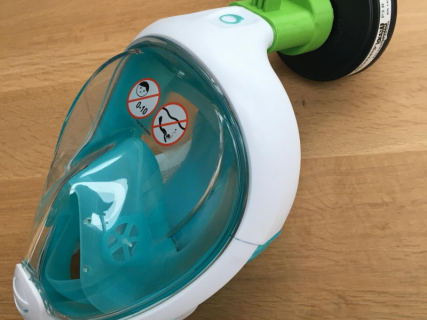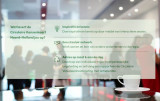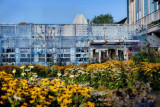While experts point out that the coronavirus is likely to spread through the air, healthcare workers are currently walking around with surgical masks unable to filter airborne virus particles. With a snorkel mask attached to a certified filter, you may be fully protected.
That is reason for Pieter van Boheemen to take action. He wants to collect masks and calls on makers to help with the further design, validation and production of parts needed to connect the masks to certified P3 filters of various brands.
During the online meetup next Wednesday, April 8 at 8:00 PM, we will exchange knowledge with students, makers, medical technologists, producers and healthcare professionals who are working on the development of spacers with which Decathlon Easybreath snorkel masks, in combination with filters, can be used as a protective mask for doctors and nurses. The masks seem very suitable for that. Pending the results of a technical validation by TNO, among others, there is already a lot of experimentation with the possibilities.
Start: 20:00
Location: Zoom (link follows after registration)Participation is free of charge.
Goal of the meetup
• First inventory of questions and answers about the design and use of the masks, connecting pieces and filters;
• Determine a strategy to collect, check, disinfect and distribute as many Decathlon Easybreath snorkel masks as possible;
• Strategies to set up a (decentralized) production chain for the production of spacers (a network of industry / makers / maker spaces);
• Strategies to accelerate validation and include the use of Easybreath masks in the RIVM / OMT advice.
Background information
RIVM (Dutch Agency for Health Care & Environment) still assumes that the coronavirus is not spread through aerosols that can arise during coughing and sneezing. A few days ago, the American MIT actually reported in the Journal of the American Medical Association that this is the case. Nature (Magazine) also argues that we have to err on the side of caution. For Pieter van Boheemen, who has the lead in this online meetup, the uncertainty is the reason for going for maximum protection. To make that possible, we need to provide a proven safe alternative to the FFP masks that are in great shortage. This alternative must be scalable to use in all healthcare institutions in the Netherlands. The snorkel masks and filters may offer this solution.
Pieter bases himself on the work of Stanford's Prakash Lab, an organization for curiosity-driven research. They work with scientists from the Swiss EPFL, the 3D printing firm FormLabs and anaesthetists from the Utah School of Medicine plus a colorful group of enthusiasts from all over the world. They keep track of their progress in a Google doc. Snorkel masks are also used for ventilation in Italy, Spain, France, Belgium, the Czech Republic and many more countries.
Similar initiatives have also started in the Netherlands: the Covid Lifesaver Mask, for example. The following article in the FD of 2 April shows that people are waiting on TNO for the results of a technical validation.
The difference between the Dutch and American initiative lies further in the filter. The COVID Life Saver Mask initiative uses HME filters (which are now used, for example, to connect tubing from respirators to a patient). Damen has also joined the initiative and may be able to supply thousands of Air-Wave filters. In these exceptional times, however, there is a shortage of everything. When you think of the thousands of people who work in healthcare, you understand that we need to look at more than just these Damen units and the HME filters. Prakash assumes a wider range of filters, including those of gas masks and dust masks (according to the P3 filter standard). The advantage of the P3 filters is that they last much longer than HME filters, which need to be replaced every 24 hours. The annoying thing is that every brand of P3 filter has a different connection. Pieter now designs and prints coupling pieces that he tests with filters from the brands 3M, Drager, Honeywell, Climax and Spasciani.
There are still many questions that creators and others can help. For example, we are looking for stocks of filters and parties that can validate the connections. There are also many practical questions about the wearing comfort of the masks, how well they can be sterilized and how the connectors and the filters can be reused.
Pending the validation and finding the answers to the questions above, we can already start collecting the correct masks. This mainly concerns the Decathlon Easybreath snorkel masks. After the meetup we will let you know how we are going to organize this.





